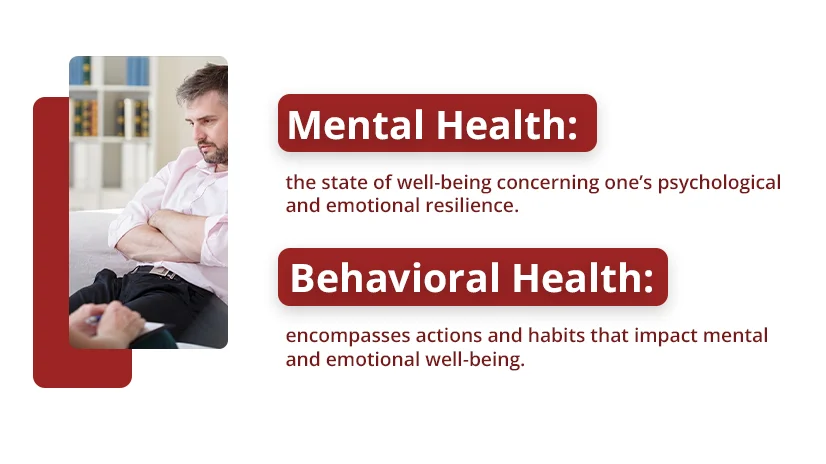
Unlocking Happiness: Tips for Improving Mental Health
Discover effective tips to boost your mental health and well-being.

Behavioral and mental health are often used synonymously, but are they the same? While both encompass aspects of psychological well-being, there are distinctions worth exploring. Behavioral health focuses on behaviors, while mental health delves into the complexities of emotion.
Please read this article to delve deeper into behavioral and mental health distinctions, uncovering their similarities and differences.

The link between behavioral and mental health underscores the intricate connection between our actions and psychological well-being. Here’s what the article covers:
Indiana Center for Recovery provides extensive mental health services to help you recover. Call us at (844) 650-0064 to get more information.
Behavioral health includes various activities related to thinking, feeling, and behaving. It includes mental health but also addresses substance abuse, eating disorders, addiction, and other behavioral health disorders. It’s about understanding and managing emotions, thoughts, and behaviors to achieve well-being. This approach emphasizes the connection between mind and body.
Mental health focuses explicitly on psychological, social, and emotional well-being. It involves how individuals think, feel, and behave in various situations. Mental health is essential for coping with stress, relating to others, and making decisions. It’s not just the absence of mental illness but also the presence of positive characteristics like resilience and self-esteem.
Common misconceptions about behavioral and mental health include the idea that mental health issues are rare or a sign of weakness. In reality, mental health problems are common and can affect anyone. Another misconception is that people with mental health issues are violent or dangerous. However, the majority of individuals with mental and behavioral health conditions are not violent and are more likely to be victims of violence themselves.
It’s important to challenge these misconceptions to promote understanding and support for those dealing with behavioral and mental health challenges.
Mental and behavioral health are terms often used interchangeably, but they refer to distinct aspects of well-being. Mental health primarily focuses on a person’s psychological well-being, including emotions, thoughts, and overall mental state. It involves mental health conditions like depression, anxiety, and bipolar disorder. Meanwhile, behavioral health addresses unhealthy behaviors that impact health. This includes habits, actions, and lifestyle choices that influence well-being.
Mental health services often involve therapy, counseling, and medication management tailored to address specific psychological issues. In contrast, behavioral health treatment may incorporate different approaches, including cognitive-behavioral therapy, behavior modification techniques, and lifestyle changes to promote overall wellness. Mental and behavioral health services aim to improve quality of life and functioning, but they employ different strategies to achieve this goal.
Understanding mental and behavioral health differences is crucial for effective treatment and support. Mental health professionals primarily diagnose and treat mental health disorders, while behavioral health specialists focus on modifying behaviors to promote healthier lifestyles. A collaborative approach between mental and behavioral health professionals can provide comprehensive care. By recognizing the unique aids of each field, individuals can access tailored interventions to enhance their overall health.
Mental and behavioral health share several similarities despite their distinct focuses. Both encompass the well-being of individuals and their psychological state. Mental health primarily deals with emotions, thoughts, and overall psychological functioning. In contrast, behavioral health addresses actions and behaviors that may impact mental well-being. Despite this difference, both fields recognize the interconnectedness of thoughts, emotions, and behaviors in shaping an individual’s mental state.
Furthermore, mental and behavioral health emphasizes the importance of intervention and support. They advocate for early identification and treatment of issues to prevent escalation. Professionals in both fields utilize various therapeutic approaches to address mental and behavioral concerns effectively. Moreover, both emphasize the role of environmental and biological factors and social influences in shaping an individual’s cognitive and behavioral health outcomes.
Additionally, mental and behavioral health share common goals of promoting resilience and fostering positive coping mechanisms. They aim to enhance individuals’ ability to adapt effectively to life’s challenges and stressors. Moreover, both fields prioritize holistic approaches considering the individual’s emotional, social, and physical health. They strive to empower individuals to lead fulfilling and meaningful lives by addressing underlying factors contributing to mental and behavioral issues.
Integrating mental and behavioral health services improves patient outcomes and enhances overall well-being. By combining these two disciplines, individuals receive comprehensive care that addresses their health’s psychological and behavioral aspects.
This integrated approach ensures that patients receive tailored treatment plans that address the root causes of their issues. Professionals collaborate closely, sharing insights and expertise to provide holistic care.
Moreover, integrating mental and behavioral health services reduces fragmentation in the healthcare system. Patients no longer need to navigate separate systems to address their mental and behavioral health concerns.
This streamlines the process, making it easier for individuals to access the support they need. As a result, there’s a higher likelihood of early intervention and prevention of more severe mental health conditions.
Furthermore, integrating these services fosters a more holistic understanding of health. It acknowledges the intricate connections between mental, emotional, and behavioral well-being. This comprehensive approach promotes long-term wellness by addressing underlying factors that may contribute to mental health challenges.
By treating the whole person rather than isolated symptoms, individuals can achieve better overall health outcomes and enjoy improved quality of life.
Mental health primarily focuses on the psychological and emotional aspects of well-being, encompassing conditions like depression, schizophrenia, and bipolar disorder. On the other hand, behavioral health encompasses a broader scope, including both mental health and substance use disorders, as well as the interplay between thoughts, emotions, and actions. While mental health addresses internal states, behavioral health incorporates external behaviors and their influence on overall well-being, emphasizing a holistic approach to health care.
Anxiety is considered a component of behavioral health. Behavioral health encompasses the interplay between psychological, emotional, and behavioral factors influencing mental well-being.
Anxiety manifests through behavioral patterns such as avoidance, restlessness, and excessive worrying, impacting how individuals interact with their environment and others. Addressing anxiety often involves therapeutic interventions aimed at modifying these behavioral responses to alleviate distress and improve overall functioning.
If you find yourself grappling with mental health challenges, know that you’re not alone. Indiana Center for Recovery is here to support you on your journey to mental wellness.
We offer support through expert medication management and evidence-based therapies like cognitive-behavioral and dialectical behavior therapy.
Our inpatient program is a comprehensive approach designed to address the unique challenges faced by people with intricate mental health needs. Our outpatient program allows individuals to receive essential care and support while maintaining their routine lives in the comfort of their homes.
Don’t wait to contact us at (844) 650-0064 for compassionate and comprehensive mental health services.